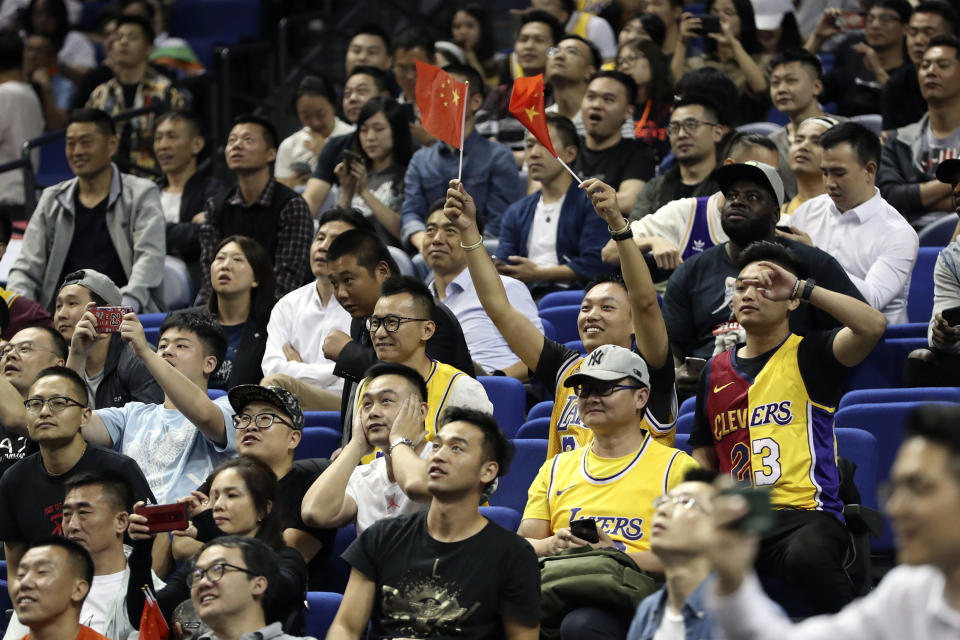There are no winners in NBA-China dustup
The NBA staged a preseason game in Shanghai on Thursday. The Brooklyn Nets defeated the Los Angeles Lakers 114-111, and most of the seats were actually filled with excited fans.
That’s the good news.
The bad?
Hey, LeBron, what did you think of the game, playing alongside Anthony Davis and getting to perform in front of the Chinese?
Who knows?
The Chinese government mandated that no players or coaches speak to the media … and the NBA actually accepted that absurd demand … and … well, this latest sad concession is par for the league’s terrible, no-good, very-bad week.
Pretty much everything has gone wrong for the NBA, and even China itself, since Houston Rockets general manager Daryl Morey sent a mild tweet last Friday showing support for pro-democracy protesters in Hong Kong. It’s basically been one disaster after the other.
Even Thursday’s game was only a marginal success. It wasn’t shown on television in China. Logos of corporate sponsors were stripped off the court. Promotional events surrounding it were canceled. There were some empty seats.
At the same time, the NBA has become such a punching bag in the United States that it created a rare bipartisan consensus in Washington.

A diverse group of politicians, including Sen. Ted Cruz, R-Texas, and Rep. Alexandria Ocasio-Cortez, D-New York — neither of whom is very popular outside of their polar-opposite bases — agreed to express their collective “deep concern” about the league.
“It is outrageous that the Chinese Communist Party is using its economic power to suppress the speech of Americans inside the United States,” the group wrote. “It is also outrageous that the NBA has caved to Chinese government demands for contrition.”
This may be outrageous, but it is also what many American companies that operate in China do on a daily basis. It’s the cost of doing business there.
Meanwhile, Donald Trump was calling Golden State coach Steve Kerr a “little boy” for not speaking up on China and Hong Kong due to economic concerns, even though Trump himself has not spoken up on China and Hong Kong, reportedly, via CNN, because he told the Chinese president he wouldn’t during trade negotiations.
Specifics hardly matter, though. It is open season on the NBA, which made itself the target by not immediately responding in clear and unambiguous terms to China’s original overreaction to the Morey tweet.
The league has never shied away from throwing its economic weight around in the United States when it comes to social issues. Kerr and a slew of players routinely sound off or get directly involved in all sorts of political issues, debates or criticisms of Trump.
Now … not much. Even on something as simple as expressing support for protesters who believe they are fighting new laws that could impact their basic civil liberties.
At a news conference following Thursday’s Houston-Toronto game in Tokyo, even reasonable questions about the situation directed toward Rockets stars James Harden and Russell Westbrook were shut down by a team public-relations official, which wanted “basketball-only” queries. The NBA later released a statement saying the Rockets official “inappropriately interjected.”
Players and coaches can argue that it isn’t their job to speak up on everything (fair enough), or that they are focused on issues that concern their communities (reasonable), or that they aren’t comfortable weighing in on foreign affairs (understandable). Or that if the White House doesn’t care about Hong Kong, why should they (valid)? But perception is reality, and the real perception is they look like hypocrites.
This entire week has been an exercise in terrible. The finer points of the argument have been lost in the onslaught of the defeat. China is slapping the NBA around.
There is one more exhibition game: Saturday in Shenzhen. That city is located right next to Hong Kong and will take place on a weekend, which is when protests during the past five months have traditionally been larger and stronger. Nice backdrop.
After that, the league needs to get the hell back home and hope the dust settles. If nothing else, opening night is Oct. 22.
How many Zion Williamson dunks will it take for people to forget all this?
It might take a lot of them. The league is now a touchstone for anti-China protests, drawing activists who actually plan out their viral moments by hoping to get ejected from NBA games. And Trump will no doubt revel in turning the NBA into a Kaepernick-esque applause line during rallies. It’s low-hanging fruit for both sides of the aisle.
Back in China, who knows what the league’s business future looks like? It’s spent decades cultivating a rabid audience into a billion-dollar business that turns star players into valued conduits to 1.4 billion citizens.
Now that could, conceivably, disappear, or at least be curtailed, which affects bottom lines and perhaps even future salary caps.
This has been ugly all around, a clear narrative set against a league that is stuck trying to argue the nuances while hoping it isn’t about to lose its pot of gold on the other side of the Pacific. Meanwhile, China’s effort to silence discussion of the Hong Kong protests backfired by generating an unfathomable amount of global publicity … for the Hong Kong protests.
All of it could flare back up with just one NBA-associated tweet, one supportive message written on a player’s sneaker, one escalation of the Trump-Kerr feud.
The NBA’s terrible, no-good, very-bad week is drawing to a close. How long the fallout lingers is the question.
More from Yahoo Sports:
